Meet the ultramarathon runner, politician and actor proving sight loss need be no barrier to career success in Sheffield
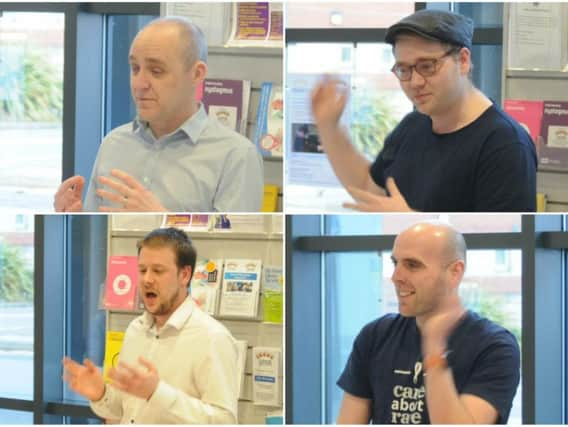

Instead, they said, it can open up exciting new employment opportunities and provide a sought-after insight for prospective employers.
One man explained how losing his vision had been the stepping stone to teaming up with tech giants and running an ultramarathon, an actor said it had helped him open up theatre to a wider audience and another man told how it had given him the drive to become a politician.
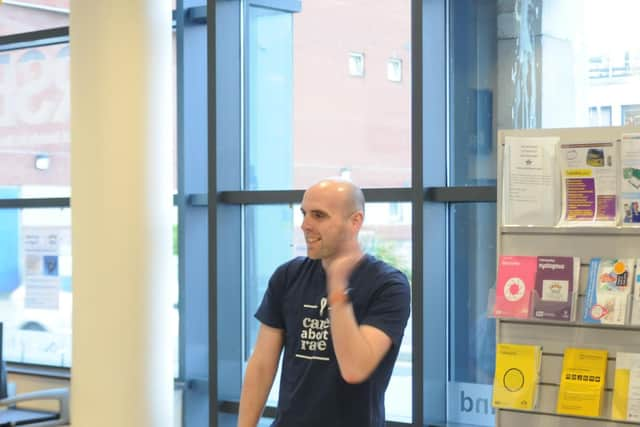

Advertisement
Hide AdAdvertisement
Hide AdThey were all speaking at a new job club set up by Sheffield Royal Society for the Blind (SRSB) to raise awareness of the talents visually impaired workers can bring to employers, and to help those with sight loss to achieve their career goals.
Research suggests only one in four blind or partially sighted people of working age are in employment, and the charity wants to give more of them the confidence and tools to join the workforce.
Joanne Ardern, deputy manager at SRSB, said: "We are fortunate that we have the support of several organisations who will bring their experience to our clients, and we also hope it will be a valuable learning experience for employers too.
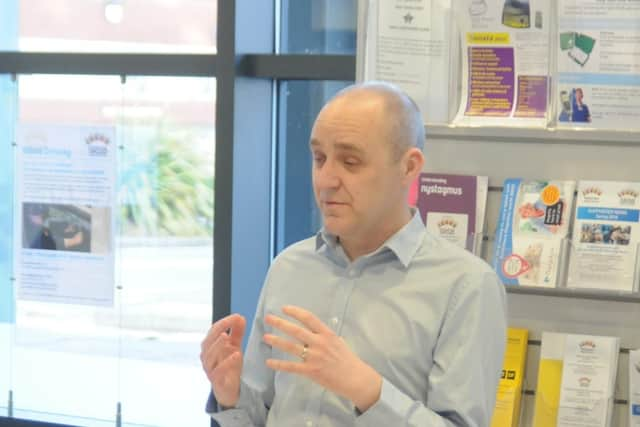

"RNIB report that only 27 per cent of blind and partially sighted people of working age are in employment. We want to address this and empower clients with skills to help them in the search for work at any stage of their career.
Advertisement
Hide AdAdvertisement
Hide Ad"Our charity is proud to have visually impaired staff, trustees and volunteers on its team. We all want to help others to find rewarding career paths too."
The free weekly club meets every Wednesday evening, from 7pm-9pm, at the charity's Mappin Street HQ, just off West Street in the city centre.
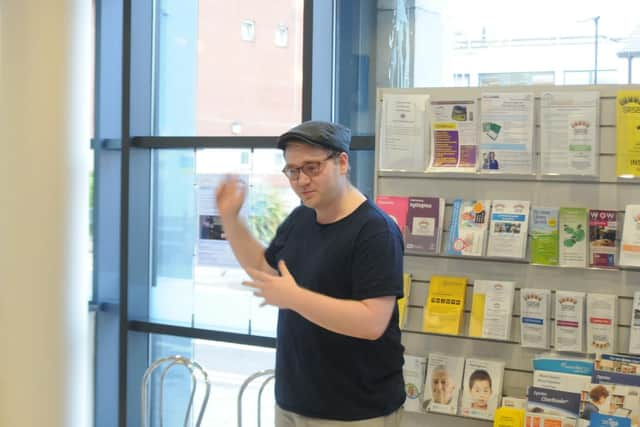

Each week, members get support and advice on everything from beginning their job search to writing CVs and preparing for interviews.
Barclays, Irwin Mitchell and Yorkshire Bank are among the major employers which have teamed up with the charity to provide their expertise.
Advertisement
Hide AdAdvertisement
Hide AdThe job club launched on April 11 and is initially scheduled to run until May 30, but the charity is keen to extend the programme and wants to hear from more employers who are willing to lend their experience.
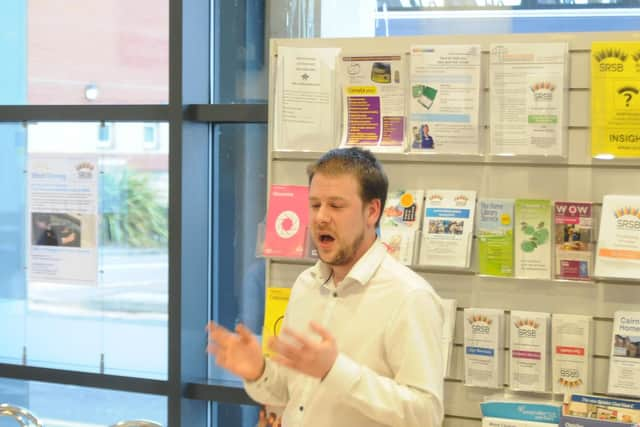

For more information, visit www.srsb.org.uk, email [email protected] or call 0114 272 2757.
Yesterday, visually impaired speakers whose careers are flourishing took to the stage to tell their motivational stories and answer questions from the audience.
Below are their stories.
SIMON WHEATCROFT
Simon, from Doncaster, had taken a break from his career in IT to go travelling when his sight rapidly deteriorated and, unable to read or see people's faces, he initially struggled to get back into work on his return.
Advertisement
Hide AdAdvertisement
Hide AdHe decided to go back to university and with more time on his hands took up running seriously with the help of a new smartphone app Runkeeper, which provided aural updates.
Realising he was one of the first blind people using the app, he began blogging about his story and emboldened by the response he sent a link to the chief executive of a major technology firm, who loved what he saw.
He was soon linking up with tech giants from Apple to AirBnB, creating adverts for them, helping to develop customised software and giving lucrative speeches about his experiences.
He began pitching increasingly ambitious ideas for new adventures, which they would support and pay him to complete, culminating in him completing a 155-mile ultramarathon across the desert.
Advertisement
Hide AdAdvertisement
Hide AdNow aged 35, he said: "Six or seven years ago I was lacking in confidence but I've got to the stage where I can call a major tech company and know I'll be able to speak to someone quite senior. That's all thanks to sending one email to a CEO back then.
"When you lose your sight you gain a unique approach to problems, and I'm often brought in to provide that different approach and come up with new solutions.
"My advice would be to build up your presence online and don't be afraid to approach any company with your idea."
MARK SKELTON
Mark, aged 42, from Rotherham, was working as a store manager for O2 when, about four years ago, he lost 80 per cent of his vision.
Advertisement
Hide AdAdvertisement
Hide AdAt first, he tried to hide his sight loss, avoiding customers where possible for fear of being found out, and when he finally plucked up the courage to speak to his bosses he feared the worst.
But he says they bent over backwards to help, providing new equipment to assist him and offering him a fresh role as a community champion helping visually impaired customers make the most of the latest smartphones.
"When I lost my sight, I'd just got married and bought a brand new house and I thought I'm going to have no job and won't be able to pay my bills," he said.
"I thought I was going to have to plead for my job but they did everything they could to help me.
Advertisement
Hide AdAdvertisement
Hide Ad"I've since realised there are a lot of good employers out there who want to retain staff, because recruiting and training new workers is actually very expensive.
"I've had several opportunities to leave but because of everything my bosses have done for me I'm really loyal.
"My job was actually fairly boring before but now it's absolutely fantastic, and every single day to me is like a little victory."
BEN WILSON
Ben works for Sheffield Theatres as an 'agent for change', tasked with opening up the Crucible and Lyceum to more disabled people, whether as audience members or participants.
Advertisement
Hide AdAdvertisement
Hide AdThe 27-year-old, from Crookes, was working as a jobbing actor when he lost his sight aged 23.
"At the time, I thought that was the end of my career in the theatre but I couldn't have been more wrong," he said.
"Losing my sight brought so much more depth to my career, which wouldn't be nearly as exciting or fulfilling if I wasn't visually impaired.
"When you're an actor you spend half your life begging for a job, but if you're blind or visually impaired you have an insight into making theatre more accessible which makes you much more interesting to potential employers, and I think the same is true in many industries.
Advertisement
Hide AdAdvertisement
Hide Ad"The turning point for me after losing my sight was realising I should be celebrating the fact I have this unique perspective, rather than seeing it as a curse.
"Once I started thinking that way, so many more doors opened and so many new opportunities came my way."
Ben added that employees should not be afraid to ask for the support to which they are entitled, especially given employers can use the government-funded Access to Work scheme to fund support for disabled staff.
And he said there was no need to fear the interview process or rejection, as employers are willing you to succeed and when most people miss out it is by the smallest of margins.
Advertisement
Hide AdAdvertisement
Hide Ad"When you're in a job, don't feel like it's your fault if there's something you can't do. It's their fault for putting that obstacle in your path, and if you talk to them you can find a way to overcome the barriers you face," he said.
"And when you're applying, don't be scared of the people interviewing you. When someone walks into the interview room you really want them to be brilliant and solve your problem so you can stop looking for someone to do that job."
KYLE CROSSLAND
Kyle, who was registered blind shortly after birth, has worked in SRSB's Mappin Street shop for eight years.
The 31-year-old, from Lower Manor, has recently got into politics and was chosen as the Liberal Democrat candidate for Nether Edge & Sharrow in this year's council elections.
Advertisement
Hide AdAdvertisement
Hide AdWhen first applying for jobs, he began doubting his ability and hated attending interviews because he was so afraid of rejection.
"It took me some time to realise I'm looking at this the wrong way and being visually impaired is just a trait which gives you a unique perspective," he said.
Kyle was initially spurred to get into politics after being forced to prove being blind didn't make him any less able to look after his young son, and he quickly became passionate about standing up for everyone's rights.
His political journey has not been without challenges, he explained, but none which proved insurmountable.
Advertisement
Hide AdAdvertisement
Hide Ad"On the day of my interview to become a candidate, I was so nervous my vision got worse and things became blurrier and blurrier," he said.
"It was so bad I couldn't see where I was going and had to get a taxi, but when I got there I was surprised by how friendly people were.
"When I brought up my eyesight, they asked if there was anything I would find difficult to do as a councillor.
"I said yes, paperwork, but I have ways around that, and they seemed relieved, partly I think because I'd come up with a solution."